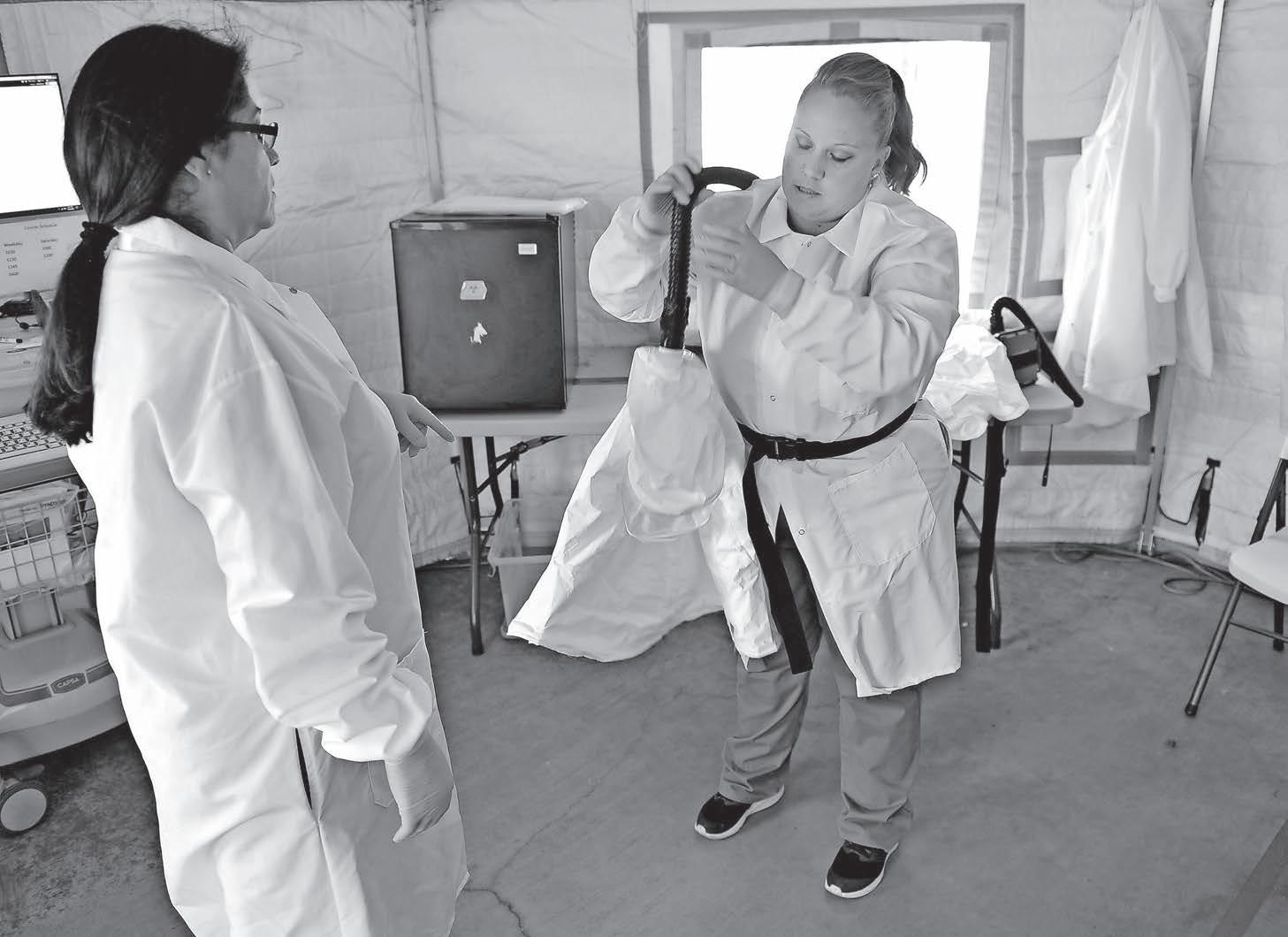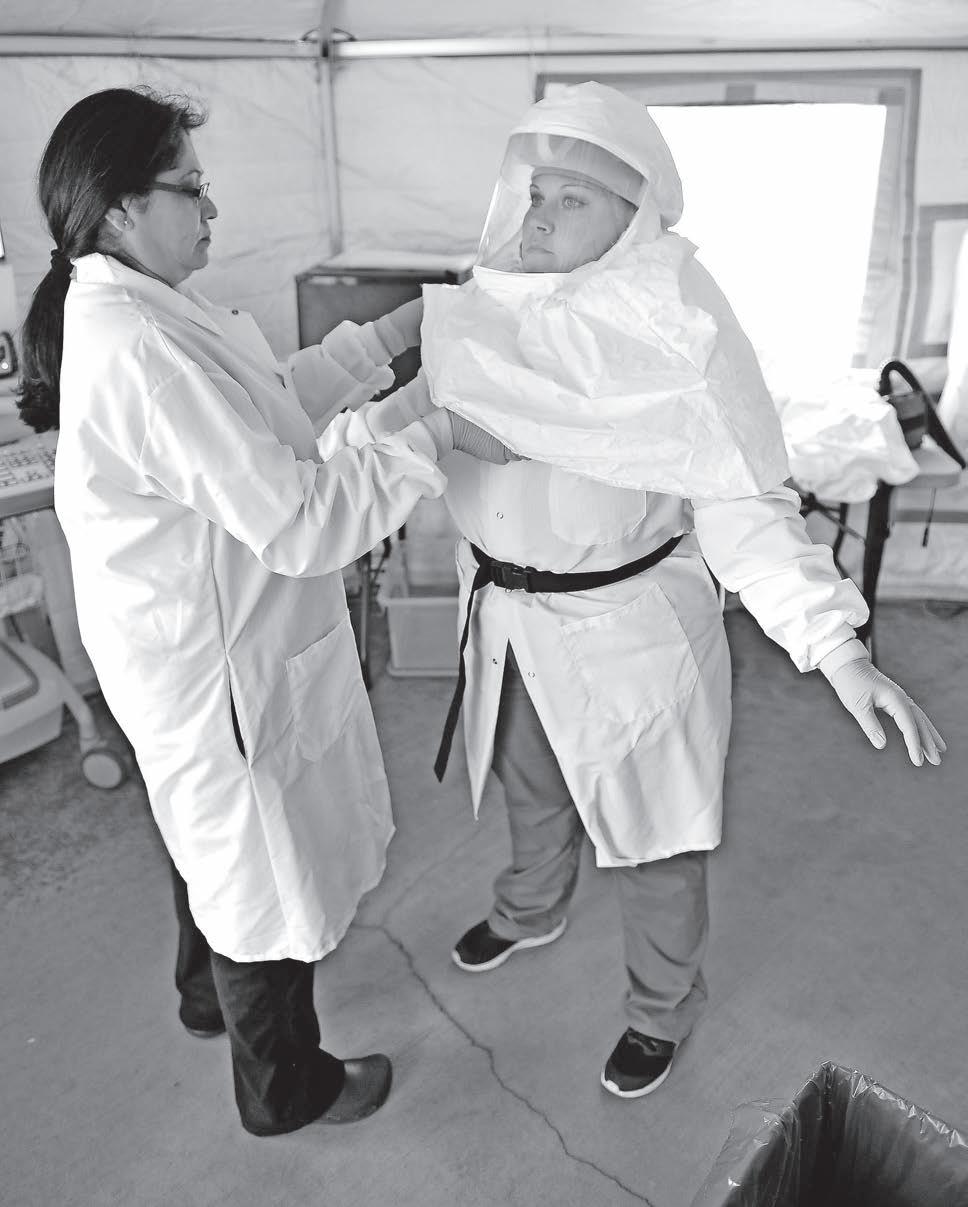
5 minute read
A TEST OF WILL: Asante specialists have battled
JAMIE LUSCH / MAIL TRIBUNE
Tiffany Kampstra prepares for COVID tesing at the South Medford drive-thru location.
Advertisement
A TEST OF WILL
Asante lab workers battle the elements, in and out of their protective suits, to screen patients for COVID-19
By Tony Boom
for the Mail Tribune
Asante lab workers have stood outside in snow, rain and 90-degree heat to collect specimens for COVID-19 testing at the drivethru testing facility set up in March off Center Drive in south Medford.
There’s now an RV located at the site where workers can retreat for shelter from the elements. By July 28, 6,054 specimens had been collected at the drive-thru.
In all, 14,749 samples had been collected and tested across all Asante locations, including one located off Black Oak Drive on the Medford campus.
Phlebotomist Tiffany Kampstra has spent up to six hours at a time in a PAPR suit that encloses the entire body and features a powered, air-purifying respirator attached to a hood. All drive-thru workers gathering specimens wear the suits.
“They are not air conditioned, so it’s blowing in the outside air. It can be up to 115 degrees inside the suit,” said Kampstra. After each patient is seen, the suits are wiped down with bleach before another is served.
Beside the suit regimen, Kampstra has put in some longer days. Even though the facility closes at 4 p.m., anyone in line then will be tested.
Phlebotomists are trained to administer the nasopharyngeal test, which is conducted by inserting a cotton swab on a stick into the nose, running it up to the sinuses and rotating to collect samples for analysis to detect the virus. Some find the test irritating, said Sherry Sorenson, manager of Asante Laboratory Outreach Services.
Asante had the drive-thru running March 13, just two days after it was proposed. In the early days over 200 patients were there per day.
Tiffany Kampstra, Asante phlebotomist
LAB WORKERS From Page 22
That slowed to around 50 in May, but has increased lately up to 120 per day.
“This was Asante saying, ‘we are going to have a need here. Let’s get it done and see what we can do for the community,’” said Sorenson.
Staffing at the drive-thru usually numbers three or four, although there were more in early days when up to 40 cars lined up at times. Patient surges usually occur at the start of the day, around the lunch hour and again at the end of the day, said Kampstra.
Patients must have a doctor’s order for the tests.
At the Black Oak lab there are seven workers. Phlebotomists at the lab wear a gown on top of a lab coat, with face shield and mask. “It’s a lengthier procedure than what we normally do … but it is really important,” said Courtney Johnson.
Administering the swab tests is not a new procedure, said Johnson, but the workers are now performing a lot more. Besides patients referred by their doctors, tests are now being required for other undertakings, such as educational camps, sports teams, businesses testing employees who have traveled out of the area, and those going to destinations that require tests.
“We clean every surface that a patient could touch and also in between patients,” said Johnson, who has been a phlebotomist for 17 years. “It’s really important to be thoughtful and do the same thing every time so you don’t miss anything.”
Morale among workers seems to be good, and interviewees said they feel protected from the COVID virus in their environments.
“We have what we call our work family. We are giving each other a lot of breaks. But we feel really safe because of all the protective equipment,” said Kampstra. “If there are concerns to make the job better, they are right on it getting us everything we request.”
Johnson said she feels safer at work than she does in a grocery store. She also said patients are understanding about the need for tests and when procedures take longer than anticipated.
“It takes a toll on workers and being around their families. You have a constant push-pull. You are scared of bringing something to them,” said Johnson. Her husband is also a health care worker, and both live with the realization they could infect each other.
Johnson usually works four 10-hour shifts per week, but those get extended regularly if there are still tests to be administered. Keeping up on the latest guideline’s is also critical.
“We have to check our emails constantly. Procedures can change depending on what will be best at the time,” said Johnson.
“We have a lot of discussions, a lot of huddles,” said Sorenson, about both locations. “They kind of keep an eye on each other. The stress isn’t about the COVID itself. The busier the day they have, the
JAMIE LUSCH / MAIL TRIBUNE
Tiffany Kampstra prepares for COVID tesing at the South Medford location. “ It can be up to 115 degrees inside the suit,” she says.

more accomplishment they feel. They really understand they are fulfilling an important service.”
Phlebotomists are in demand nationally to conduct the testing, Sorenson said, and Asante is looking to hire more but at the same time asking staff to work more hours. The Black Oak lab is open from 8 a.m. to 8 p.m. seven days a week.
Besides the lab and drive-thru, Asante has a mobile van, which Kampstra sometimes staffs, and which can go to retirement homes, skilled nursing sites and people’s homes.
The van serves a really fragile population that Asante doesn’t want coming to the drive-thru or a public location, said Sorenson.










